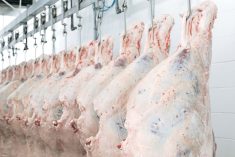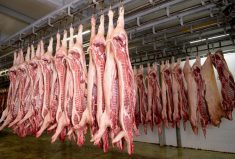Farm groups across Canada expect a new interprovincial trade agreement to clear paths for more trade in Canadian-grown agrifood and other farmed products within the country, reducing the need for imports.
Federal, provincial and territorial ministers on Friday announced they’ve concluded talks on a new Canadian Free Trade Agreement (CFTA), which on July 1 will replace the current Agreement on Internal Trade (AIT) that’s been in place since 1995.
Ministers on Friday noted the new deal takes a “negative list” approach to trade, in which the deal declares all trade barriers across all sectors of economic activity to be lifted unless specifically identified as an exception.
Read Also

U.S. livestock: Cattle steady ahead of feed report
Cattle futures on the Chicago Mercantile Exchange held close to unchanged on Thursday, with the bias lower in the most…
The CFTA will also automatically apply to goods and services in “new and emerging” sectors, an aspect that’s expected to remove regulatory uncertainty.
According to an Ontario government release Friday, the deal makes Canada the first country in the world to have a binding process to harmonize or mutually recognize existing regulations affecting trade.
The CFTA is also meant to align domestic trade rules with international trade agreements, such as the Canada-European Union Comprehensive Economic and Trade Agreement (CETA), providing guarantees that Canadian businesses get no less favourable treatment than EU suppliers will have in Canada under CETA.
The Canadian Federation of Agriculture, for one, “is pleased that the agreement is structured to facilitate the flow of goods using an over-arching non-discrimination principle,” president Ron Bonnett said in a separate release Friday.
“This will ensure that technical aspects don’t create unnecessary barriers to trade within our own borders.”
The CFA on Friday noted several areas in which farmers face difficulties in interprovincial trade, such as trucking transportation regulations and differing requirements between federally- and provincially-regulated meat processing plants.
The group said it also awaits more detail about a new Regulatory Reconciliation and Co-operation Table, which is to be set up within a year from July 1 to co-ordinate processes for resolving specific trade barriers that provinces and territories identify.
Participating ministers used the “illustrative example” of gasoline and diesel fuel blending requirements, which vary between provinces.
Governments that don’t regulate fuel blending or don’t want to take part in a reconciliation agreement would not take part in the process, while governments that do take part would come to an agreement to harmonize their requirements.
“We see the regulatory reconciliation process within the new agreement as a very important mechanism to assist in our efforts to access markets across Canada as cost-efficiently as possible,” Rodney Dingwell, chair of the Prince Edward Island Potato Board, said in the P.E.I. government’s release.
The reconciliation process, he said, is expected to “help resolve barriers to trade in the food industry when we encounter them.”
Canada today imports over $47 billion in food, “much of which is meat, grains and vegetables that Canadian farmers also produce right here at home,” Dan Mazier, president of Manitoba farm group Keystone Agricultural Producers, said in the Manitoba government’s release Friday.
“Interprovincial trade barriers have too often made it easier for processors and retailers to import food from another country, than from another province,” he said, noting “time and time again Canadians have made it clear they want to be eating Canadian-produced food.”
The CFTA’s timeline beyond July 1 commits partner governments to set up a working group within a year, to recommend “initiatives to further enhance trade in wine, beer and spirits within Canada.”
The deal also calls for the federal and three territorial governments to set up a working group within six months from July 1 to look at “options for economic development and initiatives in the territories’ food sector.”
Within a year from July 1, a working group would also set out recommendations to the “to address the challenges associated with producing healthy food and to mitigate the high costs of food for residents of the territories.”
Overall, “companies will find it easier and less costly to sell their goods and services across the country, which means Canadians can expect more choice and pay less for what they buy,” Navdeep Bains, the federal minister for economic development, said in a separate statement. — AGCanada.com Network















